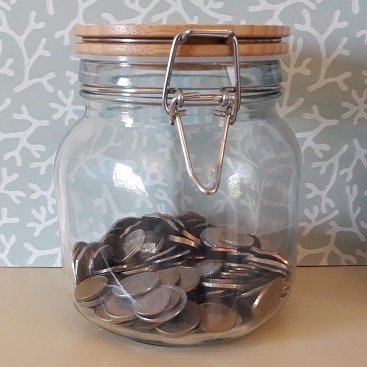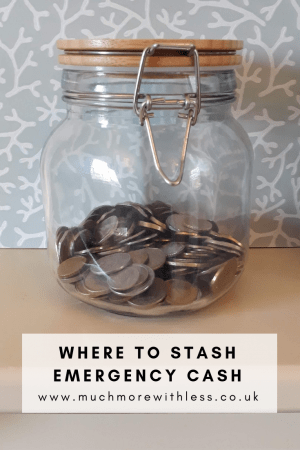
Clue: not in a jar
So who’s got emergency savings? And no, I don’t mean a few coins down the back of the sofa.
Why bother with emergency savings?
Emergency savings are vital. An emergency fund rides to the rescue if the boiler blows up, the car breaks down or your job disappears (and Sod’s Law states all three are bound to happen at the same time).
Use savings, rather than borrowing money, and you’ll avoid expensive interest on credit cards and overdrafts, or the tricky dynamics when borrowing from family or friends.
I’d always rather get paid interest on savings, than pay someone else to borrow their money. Plus, I’m keen to hang on to my nearest and dearest. So emergency savings are A Good Thing.
How much do I need in emergency savings?
In their wisdom, financial experts recommend stashing away three to six months’ of living expenses.
So if your bills and spending come to say £1,500 a month, that adds up to between £4,500 and £6,000.
Woah. That’s a whole heap of cash, especially when a shockingly high proportion of people don’t even have £100 to their name. (Previous post)
But think about it – if your salary stopped, would you just walk into a new job the next day? I find enormous peace of mind knowing that if our income vanished, we’ve got the savings to keep a roof over our heads.
If three to six months’ living expenses seems utterly impossible, remember even smaller amounts will help. Dave Ramsey, the US evangelical debt basher, for example, suggests saving £1,000 as an emergency fund before paying down debt. Better to start somewhere.
What kind of account is best for emergency savings?
The whole point of emergency savings is that you can get hold of the money in an actual emergency, so that affects what account to use. Interest rates may be rubbish right now, but I still like to make the most of my money.
Here’s what I look out for:
- Keep it in cash. I bang on about investing in the stockmarket to grow your money in the long term. (Previous post) But for money in a hurry? Cash is king. You never want to be in the position where you need your emergency money RIGHT NOW but the value has plummeted after a stock market fall.
- Choose the right account. Avoid bank accounts with restrictions on withdrawals. Think easy access, so you can whip your money out PDQ, rather than notice accounts or fixed-term bonds.
- Go online. With internet banking, you can transfer cash without waiting for branches to open, or telephone banking to start.
- Earn interest. If you’ve got money stuck in cash, make sure you’re earning as much interest as possible. Look for the highest interest rates where your money is still accessible. I check the best buy tables from Savings Champion and Moneyfacts
- Consider current accounts. Surprise! You may find higher interest rates on current accounts than savings accounts. Yes, it’s more effort at the start, meeting the small print by setting up monthly payments into the account and direct debits. (Previous post) But once set up, it should take care of itself, while you sit back and earn extra interest. Best to open a separate account for emergency savings, rather than risk temptation if you can see them in your everyday current account.
- Be prepared to open several accounts. Several of the highest interest rates are only paid on limited amounts of money. If you want to earn as much interest as possible, spread your emergency savings across several accounts.
- Take advantage of tax breaks. You don’t even have to use a individual savings account (Isa) to stop the taxman taking a cut of your emergency savings. If you’re a basic-rate taxpayer, you can earn up to £1,000 a year in interest without paying a penny in tax – it’s known as the Personal Savings Allowance. Higher-rate taxpayers can earn £500 interest a year, tax-free. So even if you could find an account paying a stonking 5% a year (hint: unlikely), a basic rate taxpayer would need a balance bigger than £20,000 before they went over their Personal Savings Allowance.
- Review rates in future. Banks have a nasty tendency to lure you in on a high rate, than whip it away later. Meanwhile new accounts appear with rates to tempt new customers. So every so often, check if your emergency savings are still earning tip top interest, and consider switching if not. Doesn’t have to be a big deal – maybe once a year?
Where to stash emergency cash?
UPDATED 6 SEPTEMBER 2019
I was originally inspired to write this post by the launch of a new savings account, which prompted me to juggle my money around.
Here’s where I reckon it’s good to stash emergency cash:
- Getting started? If you struggle to save, then get Chip, the automatic savings app, to do it for you. Chip might not pay interest to new savers any more, but it does work out what you can afford to save and then transfers small amounts every few days. You can ask for the automatic transfers to be increased or decreased, and also move money across yourself, known as ‘manual saves’. (Check my review of Chip).
- Bit of a balance? Check out the highest interest current accounts. Good rates on limited amounts, but make sure you meet conditions about how much you pay in each month, and how many direct debits go out. Rates have been cut right, left and centre, so the highest rates available as of 6 September 2019 will cover £4,000 in emergency savings:
- 4.89% a year on up to £2,500: Nationwide Flex Direct current account. Careful though, because the rate drops to 1% after a year.
- 2.96% a year on up to £1,500: TSB Classic Plus current account. Cut from the higher rate introduced after their internet banking hassles.
- Still high after all their internet banking hassles.
- Wodge of cash? I like Marcus, the super simple internet account launched last year by Goldman Sachs, the big investment bank. It remains one of the highest paying easy access savings account around, even after cutting the rate from 1.49% to 1.44%. You can save from £1 up to a whopping £250,000, and whip your money in and out as often as you fancy. This means you don’t have to faff around with other current accounts that pay pretty much the same interest with more restrictions (*cough* Santander 123 current account). Yes, the rate includes a 0.15 percentage point bonus for a year, but afterwards you can renew your bonus and opt in to whatever rate they’re paying then. As someone who’s a bit wary of brand new start ups, I’m glad Marcus is backed by such a long-established bank.
So I reckon a combination of current accounts and a Marcus account will make the most of my emergency cash.
Now – over to you. Do you have any emergency savings? Ever found them useful? Do share in the comments, I’d love to hear!
Pin for later:

In the same vein- I’d like to make the following suggestions.
Since the Financial Crisis , I have kept a small amount of emergency cash in the house – not a lot – but enough to buy basic groceries. When the cash points won’t work ( be it another financial crash or cyber attack); or supermarkets have IT problems, I will be able to buy milk etc. At that point waving a plastic credit or debit card around would be totally useless.
Also it may be worth keeping a small buffer on any loyalty cards for emergencies. I once paid for my shopping with stored up Nectar points when my local Sainsburys computerised tills had a tantrum. For some reason that part of the system still worked!
Maybe I’m old-fashioned but cash, while ever we have it in the system , is King.
Author
Good point about keeping some actual cash in the house for emergencies. We put our £2 coins in a polar bear money box, which comes in handy if I’m ever short of readies! https://www.muchmorewithless.co.uk/2016/10/save-in-october-1-hoarding-2-coins.html
Yes….just wanted to say what the person above me said. Even if the power goes off in our area for 12 hours or so you need cash to run to the store when the cash registers and ATM are not working. I always keep a few hundred in small bills hidden on hand in the house for disaster type emergencies. If I have to vacate the house, like when I have to move uphill because of a tsunami threat for example, I put the money in my money belt along with passport, IDs and credit cards and wear it under my shirt just like when I am traveling overseas.
Author
Wow. Great preparation for tsunami warnings. Feeling very grateful right now that we don’t get those in Suffolk!
I have recently just reshuffled my cash and THEN Marcus arrives on the market. Can’t decide whether I should do more shuffling. Probably! But I might give myself a month off.
Author
How frustrating! But good for you for reshuffling your cash. All I would say is opening a Marcus account was super speedy (think 10 mins). You can only pay into Marcus from one linked account, so if you have several current accounts, think about which would make transfers easiest.
I just want to say Thank You to everyone who supported me through the years. My name is Manuel Franco, New Berlin, Wisconsin. My story of how I won the Powerball lottery of $768.4M is a bit of a tale. I have been playing Powerball tickets for 6 years now since I turned 18. I bought my first ticket on my 18 birthday. I was feeling very lucky that day because I had contacted Dr. Odunga Michael to help me with the winning Powerball numbers. I really had that great great feeling that I looked at the camera wanting to wink at it. I only did a tiny part of it and trusted him. He gave me the numbers after I played a couple other tickets along with it for $10. I checked my ticket after the winnings came online and saw the numbers were correct including the Power play. I screamed for about 10 minutes because it felt like a dream. I had won $768.4M. You can check my winning testimony with the lottery officials just with my name search. Thank you Dr Odunga. Well, his email is odungaspelltemple@gmail.com and you can also call or Whats-app him at +2348167159012 so you guys can contact him